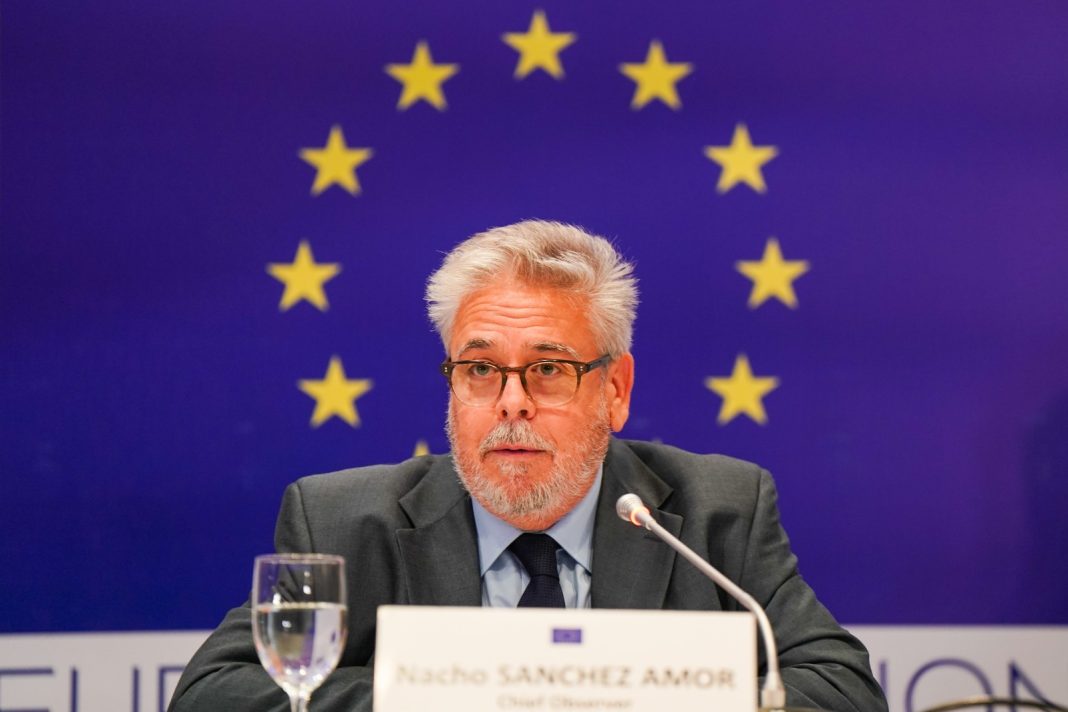The European Union polls monitors have accused former President Ranil Wickremesinghe of distorting the playing field during campaigning ahead of the Presidential election.
Issuing a preliminary statement on the 2024 Presidential Election, the EU Election Observation Mission (EU EOM) said that salary increments for public sector employees, social benefit schemes, an interest-free student loan plan and monetary support programmes for small businesses, all announced by the executive during the campaign and covered in a positive tone on state media, were aligned with the incumbent’s re-election bid.
“The line between governing and campaigning was further blurred by the participation of state and local officials in the incumbent’s rallies. This was aggravated by the absence of elected provincial and local councils,” the EU EOM said.
Nacho Sánchez Amor, Member of the European Parliament from Spain and Chief Observer of the European Union Election Observation Mission (EU EOM) to Sri Lanka, presented the mission’s preliminary findings for the 21 September presidential election.
“The 2024 presidential election was a pivotal step for Sri Lanka, as the first electoral contest, after the unprecedented economic and political crises of 2022. The Election Commission conducted the process independently and with resolve, ensuring transparency at all key stages of the election. The election itself offered voters genuine political choices, and the campaign was largely peaceful and energetic,” he said.
However, he said the advantage of incumbency tilted the playing field, while some manipulative digital campaigns aimed to confuse voters.
The Chief Observer noted that the election day was orderly and calm, with well-trained polling staff efficiently facilitating voting in all polling stations observed by the EU EOM.
The first count of the ballots was equally well-organised, ensuring the integrity of the process, although at times the premises were crowded. The presence of citizen observers and party agents in polling stations, counting centres and at the tabulation of results added to the transparency of the process.
The Election Commission of Sri Lanka (ECSL) managed its responsibilities transparently, earning stakeholders’ trust. The Commission worked closely with civil society and monitored the campaign, despite having limited enforcement powers. It also took public stances against the misuse of state resources and addressed other campaign violations, noted the Chief Observer.
The legal framework provides a solid foundation for democratic elections, with recent reforms improving privacy protections and regulating campaign finance. However, new and proposed laws create powers which could restrict political freedom.
The campaign was competitive, and fundamental freedoms were broadly respected. The media coverage of the presidential contest was lively, yet media offered very limited non-partisan scrutiny and analysis, which would have helped voters to make an informed choice.
National fact-checkers and civil society organisations made a positive contribution to the different stages of the election and strengthened transparency. They were agile in flagging disinformation, tracking violations of election rules and calling public attention to the misuse of incumbency.
“While the election framework supports a democratic election, improvements could be made to refine the electoral process, including by enhancing transparency in political finance and advancing women’s participation in public and political life,” added Chief Observer Sánchez Amor.
The EU EOM has been present in Sri Lanka since 14 August, with over 70 international observers deployed across all nine provinces. The mission will continue to observe the post election environment and will publish a final report, including recommendations for improving future elections, in the coming months.


